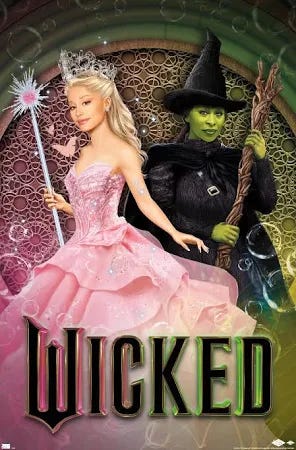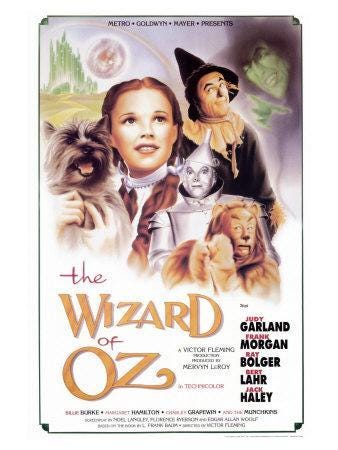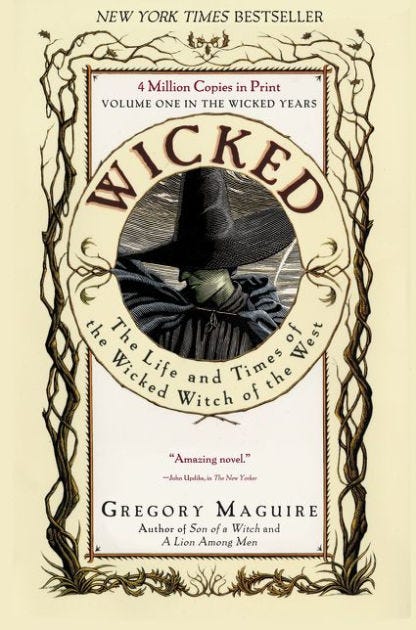Welcome to the First Year of the Rest of Our Lives
The next epoch in American culture will gradually come to be defined by the wars in the Middle East as the last eighty years have been defined by the tropes and stories of WWII.
Ways to be Wicked
I watched the new Wicked movie the other day with the family. It’s a new movie musical based on a 2003 Broadway musical Wicked, and if you’ve seen the Broadway musical and liked it (as I did), then I recommend the movie.1 Anyway, the Broadway Wicked was based on a 1995 novel Wicked by a writer named Gregory Maguire (which I haven’t read), which was based mostly on the 1938 movie musical Wizard of Oz (which I have seen many times), which was based on the original 1900 children’s novel, The Wonderful Wizard of Oz by a writer named L. Frank Baum (which I have read).2


Watching the movie, I thought of how assumptions about protagonists and antagonists have changed radically over the last century. I don’t mean just switching heroes and anti-heroes; I mean what is assumed about the motivations of protagonists and antagonists, and how these come from broader national narratives.
But first some business…
I created this Substack back in July to write weekly installments of Welcome to Charlottesville. I mostly finished that run in October except for a couple of interstitial pieces that I’m pecking away at. In January I’ll be workshopping a script for a spring production of Welcome to Charlottesville as a play. This wouldn’t have happened if folks like you weren’t reading.
So thank you so much! (I’ll have news about the show as it progresses.)
The Great American Postwar Story
I launched Welcome to Charlottesville because I believed—and still believe—that the Unite the Right rally here in 2017 presaged a lot of changes for our country.3
So far I think I nailed it.
To recap, Donald Trump, already unpopular in 2017, couldn’t figure out what to say about Unite the Right and the Alt-Right who organized it that would resonate beyond his core supporters. (After all, in some cases the Alt-Right were his core supporters.) Other Republicans tried harder, but could only manage to spout cliches. The Alt-Right went too far, or were too extreme, or my favorite— Hate has no place in America.
That’s where that Great American Postwar Story hovers over us. This has been our national story for the last eighty years and it goes something like this: Americans, a good and decent people, pulled themselves out of an economic depression with pluck and can-do spirit, and when attacked by the Axis Powers—who being bad and undecent were driven by hate and fanaticism—drew on their American decency, pluck, and can-do spirit to rescue Great Britain, defeat the Nazis, defeat Japan, end the Holocaust, save Europe, and spread freedom, appliances, and Coca-Cola around the world. From there Americans went on to stop the Communist expansion, end racism at home, end sexism at home, and finally defeat the Communists altogether beneath the might of superior American freedom, appliances, and Coca-Cola!


Now I’m poking fun, but there’s actually a lot of truth in the Great American Postwar Story. Yes, there’s also a lot of omission, simplification, and distortion, and one could tell a far less flattering story with the same characters and events. Many have. But right or wrong Americans have really and truly cherished and believed this story for decades, and even if Americans no longer believe it enough to admit to believing it, and many on the left and right are obsessed with tearing it apart, we’re still saturated with its motifs and assumptions.4
So Republican lawmakers in 2017, steeped all their lives in the Great American Postwar Story, sensed that the Alt-Right were fascists, and that fascism, being the villain of the Great American Postwar Story, must be bad, but they couldn’t quite remember why. Hence those cliches about too far, too extreme, Hate has no place in America. This inability of American leaders to identify what was wrong with the Alt-Right, Unite the Right, and so on, shows the inability of American leaders to understand what they’re in charge of, what sorts of things should be done, and how to do those things. (That’s what Welcome to Charlottesville has largely been about.)
The problem with this is not as many on the left would have it that the Republicans believe in the Great American Postwar Story and too many parts of it are untrue.5 The problem is that the entire story—the true and not true—finished more than TWENTY YEARS AGO—but those who achieved power and wealth under its aegis haven’t noticed.6
Voters have. No one needs leaders who can’t articulate what’s wrong with fascists. Thus came the defeat of the Republicans in the 2018 midterms, and the defeat of Trump himself in his 2020 reelection campaign (despite his illegal and incompetent attempt at a coup).
Voters, still waiting for something else, as they had been in 2006, 2008, 2010, 2014, 2016, and 2018, kicked Trump to the curb.
Trump, Biden, Trump II
The guy who beat Trump, Joe Biden, claimed he’d decided to run for president after being horrified by the scenes of Unite the Right on TV. “This is not who we are,” he said but what Biden meant was not that he would reform the system to prevent the rise of nascent fascist and far-right movements. What he meant was that Unite the Right didn’t fit the Great American Postwar Story. Biden and the new Democratic leaders could no more say why fascism was wrong or what to actually do about it than the Republicans. The fascists are just the bad guys, everybody knows it, period. Biden and the Democrats too haven’t noticed that the story ended more than TWENTY YEARS AGO.
But again voters have noticed. Thus came the defeat of the Democrats in the 2022 midterms. Biden dropped out of the 2024 presidential election after the first presidential debate showed that he was manifestly unfit for office. This was too late for the Democrats to hold primaries (For Biden and so many other Democrats to keep his unfitness a secret for so long is as unforgivable in its way as Trump’s attempt at a coup.) so the Dems united around VP Kamala Harris. But Harris’ campaign, although it got off to a surprisingly decent start, ended up being little more than I’m Not Trump.
Voters, as still waiting for something else, as they had been in 2006, 2008, 2010, 2014, 2016, 2018, 2020, and 2022, kicked Harris to the curb.
Trump, Biden, Trump III
Since taking office Trump has promised to cut waste in government, expand the military budget, and talk tough abroad—the playbook ever since Reagan took power—which won’t work today any better than it worked for the last several presidents (including Trump himself four years ago).
So goodbye to Republican control of the House of Representatives in 2026, and as voters voted against incumbents in 2006, 2008, 2010, 2014, 2016, 2018, 2020, 2022, 2024, and 2026, whoever the Republicans nominate in 2028 has a spot on that curb ready and waiting. Incumbents will keep losing until realignment by a more skillful politician brings a new political consensus.
But you probably sense all that, even if its too depressing to think about. My contention is that this year will be more than the back-and-forth of our national power vacuum. My contention is that this year the Great American Postwar Story itself died.
The cause was war.
War
Even minor wars push events at home in one direction or another. Commentators at the turn of the last century noticed that the Spanish-American War seemed to drain all liberal Republican opposition to the rise of white supremacy in the American South.7 Empire abroad ended up being a major cause of segregation at home.
But minor wars are seen in the context of major wars. As long as most of the leaders in society witnessed the last major war, everything tends to be seen in that framework. When enough time has passed—around eighty years—for the adults who participated in the last major epoch-defining war to die off, all that’s left are people who grew up in the shadow of that war, with the stories of that war, but no direct knowledge of it, and that gradually clears the way for a new narrative-generating event.
So the War of 1812 and the Mexican-American War were to a large degree interpreted through the experience of, and then through the story of the American Revolution. Then the Civil War comes around and the participants in the Revolution are long gone, the stories too indirect, and so the Civil War becomes a new defining event. The Spanish-American War and WWI are interpreted first through the experience of, and then through the story of the Civil War. But by the time WWII rolls around all the Civil War experiences and their voices are long gone, so WWII becomes a defining event. The story of that defining event becomes an overarching national narrative, what I’ve called the Great American Postwar Story.
So now here we are eighty years after WWII, with direct experience of that conflict gone from our national leadership, our ruling classes left only with the Great American Postwar Story lingering as half-remembered archetypes and motifs.
Which takes us back to Wicked.
SPOILERS ALERT!
The Wonderful or Not-So Wonderful Wizard
Wicked, the book and musicals, flips the Wizard of Oz story so that the Wicked Witch of the West is the protagonist and the Wizard is the antagonist. Which is fun and fine, but I’m interested not in who the antagonist is so much as how they are imagined.
Wicked came from a 1995 book and a 2003 stage musical which were prime Great American Postwar Story. In that era, influenced by Hitler and WWII, all antagonists tend to be a bit fascist. So the Wizard—the villain—is imagined with a secret spy network, a ruthless army, a hate-driven agenda based on persecution of minorities, and grand futuristic plans. Hitler stuff. Lots of Hitler stuff. The movie, twenty years later in the waning days of the Great American Postwar Story, carefully minimizes the iconography. There aren’t marching armies, fo instance. But the wizard still plays groups against each other, encourages discrimination and prejudice, and has a grand vision of a New Oz.


The 1938 movie musical, which was pre-war, has none of this. There are some shots of a Winkie army marching in formation, which might be influenced by the 1935 Nazi propaganda movie, Triumph of the Will, but the Winkies are no fanatics; they don’t fight battles and they celebrate when Dorothy kills their ruler. For terror the movie relies not on armies but on the witch herself and her flying monkeys, both of which come from the original 1900 book.
Of course the original book is entirely pre-fascist, and pre-WWI, and pre-communist too. There is no hint of the Great American Postwar Story in The Wonderful Wizard of Oz. No Hitler stuff at all. The Wicked Witch of the West is a villain because, well, this is what author L Frank Baum says after she dies:
There was great rejoicing among the yellow Winkies, for they had been made to work hard during many years for the Wicked Witch, who had always treated them with great cruelty.
That’s it. She makes people work hard serving her, and she’s cruel about it, which she gets away with because of magical powers that the Winkies don’t possess.8 We could go back to the 1900 novel in more depth, which would be fun to do sometime, but for now note that in the 1900 book and 1938 movie musical human suffering is not caused by prejudice nor by discrimination. That bears repeating:
Before the Great American Postwar Story suffering does not come from a failure to give people an equal chance regardless of their backgrounds, nor from fanaticism, nor from visionary people with crazy collectivist dreams.
Suffering is caused by exploitation and cruelty. Period.
Villains are cruel people who crave power over others. They are often smarter and more talented than the good, but usually lack the patience, humility, and kindness that wins in the end.
This was the model when Great American Postwar Story got started after all, and the Nazis and Hitler were first seen merely as cruel people who crave power over others, but as the end of the war showed the extent of Nazi actions, cruelty and the craving for power didn’t seem enough to explain it, and so as decades went by the Great American Postwar Story increasingly incorporated Hitler’s tendency toward ideological goals, fanaticism, bigotry, and hate. These, not mere cruelty and craving power, seemed the more important vices of a true villain.
Again, the witches, Winkies, or Munchkins of 1938 are not persecuted based on identity. No one is a bigot. No one has ideological goals. Villains are people who force others to work for them and lack patience for small dogs. As far as hate, the Munchkins hate the witch and the witch hates Dorothy, but hate is just an emotion, not a basis for separating good from evil.9 Good people try to be patient and kind. Bad people don’t. That’s what make the bad people bad.
Flash forward to 2024 and having vaunting ambition and craving power over others have become the virtues of our leadership class, while a lack of patience, humility, and kindness—rebranded as drive, confidence, and competitiveness—are the hallmarks of success. Of the characters from the 1938 movie, only the Wicked Witch, not Glinda, Dorothy, or the Wizard, would get to be on Shark Tank.
In is full refulgence the Great American Postwar Story villains had both the old cruelty and greed, and the Hitler-inflected ideology and hate. But now in its twilight the Great American Postwar Story the cruelty and greed are dim memories, and all that’s left to make a villain is prejudice, discrimination, and hate. Even hate is fading. After all, does the protagonist of Wicked really hate less than her antagonist wizard? Evil now is gleeful, cynical. In Wicked even the wizard’s ideology seems dishonest. Leaving bad people with no clear virtues or vices to be differentiated from good people. They just have wrong opinions.
Which brings us back to those wars.
Joe Biden’s Wars
Biden’s historic mismanagement of the Democratic Party pales in comparison to his mismanagement of two terrible, world-changing wars. I’ve written about the Ukraine War here, where Biden successfully propped-up Ukraine against a Russian invasion, and then wrested defeat from the jaws of victory by shutting down peace negotiations. Then by piling on sanctions and destroying (allegedly) energy pipelines, we forced Russia and its strongman president Vladimir Putin into finding other markets, restructuring Russia’s economy, military, and diplomatic efforts, and becoming a true world power. Which Putin did. Meanwhile Russian armies have been winning in Ukraine for well over a year. Sometime in 2025 Ukraine will surrender.10
But Biden’s handling of Ukraine looks like a masterpiece of statesmanship compared to his actions in the Middle East. On October 7th, 2023 Israel suffered a horrific surprise attack and kidnapping spree by militants from the Gaza strip, an area under Israeli military blockade for decades. Israel has retaliated against all Gazans with a year-long onslaught of mass murder, torture, sexual assault, assassination, and ethnic cleansing that recalls the Khmer Rouge, Tamberlane, or the Einsatzgruppen.
Instead of restraining Israel in accordance with international and U.S. law, humanity, common sense, and the actions of all past presidents, President Biden backed the whole thing. He could have brought peace and hope for Palestine and Israel with a phone call. Instead he authorized—and still authorizes—unlimited supplies of weapons, and diplomatic cover too. I’ve written about the Gaza War here.
Never in American history has a presidential administration given unconditional support to pointless brutality on such a scale. It’s terrible for the Palestinians and Arab-Americans, it greatly hurt Biden’s political party in a general election, it does not benefit the U.S. public in any way, and arguably in the long run dooms Israel too. But Biden and the current Washington leadership are as confused by Israel brutality as the Republicans were by the Alt-Right.
Everyone senses that slaughtering civilians is bad because the Great American Postwar Story says so, but our leaders can’t quite remember why. After all, Hamas killed first, didn’t they? Isn’t that what the Bad Guys do? Hamas killed Israelis, who are Jewish, so isn’t that antisemitism? If the Great American Postwar Story tells us anything, doesn’t it tell us that antisemitism, being prejudice, is the worst thing?
It isn’t just the fault of pro-Israel lobbyists and Israeli-American billionaires that criticizing Israel is confusing. It’s an uncomfortable subject for many Americans. Not only are we not well-informed about Israel or the Middle East (And that is the fault of the pro-Israel lobby and Israeli-American billionaires.) but we’re trying to see the world through the long-outdated Great American Postwar Story that cannot dilineate between the good and the bad except by who holds what opinion. What to do when two opinions, both endorsed by the Great American Postwar Story, collide?
According to the Great American Postwar Story good countries follow laws, avoid harming civilians, treat all the people they rule the same, and so on, but by that measure Israel must be bad. But Israel must be good too since its creation was an essential part of the Great American Postwar Story.
Critics on the left and right over the years have debunked or discredited many of the Great American Postwar Story’s most appealing details, and our economic changes, misgovernment, and brutal foreign policies have exposed so many hypocrisies and illusions, how can we face a final blow? How can we stomach the terrible irony that we freed a people from genocide and gave them their own home, only to have those same people committing genocide themselves eighty years later?11 Woven through the Great American Postwar Story is the notion of progress (as its woven through almost all of our national narratives) but what progress can there be when even the survivors of genocide commit genocide?
Can’t anyone ever learn anything?
The Next Story
Of course people learn. But mostly through experience, and as we’ve seen, a generation that directly experiences a depression, a war, an epidemic eventually passes away, leaving only stories of what they learned, and stories aren’t enough. Stories of the American Revolution didn’t stop the Civil War; they may have inflamed it. Stories of WWII didn’t stop the genocide in Gaza; they may have inflamed it.
Over the next couple decades even the stories will fade as politicians of Biden’s generation retire and pass away. Meanwhile the campus protestors who opposed Israel and were condemned for it will go on to have jobs and families and money—and lots of anger. News about Gaza will trickle out year by year. It was never hidden in other parts of the world, countries and regions whose perceptions are not distorted by the Great American Postwar Story, and information will trickle back here. Corpses, exposures of lies and excuses, revised casualty counts, Israeli confessions and Palestinian revelations, mental health repercussions in Israel, and so on will seep into American consciousness and weave into our next national story.
The words zionist and zionism will become—are already becoming—as strange and alien to American ears, including many younger Jewish American ears, as tenement, mental retardation, or colored are to someone my age. In time the American Jewish community will turn on Israel and claim (falsely) that they didn’t know. It took almost a generation for the Holocaust to assume the central place in the Great American Postwar Story and a nearly a generation after that before Israel took on such a central place in the American Jewish community’s view of Jewishness. It will take decades before Israel is seen as evil by a majority of Americans, and years past that before it is seen as as embarrassing by the American Jewish community, but both will happen. As years pass and eras change, eventually epochs change too.
Biden will be remembered with revulsion as Neville Chamberlain was/is, but not because Israel will be seen as Nazi Germany. My whole point is that Hitler’s Germany will fade to be a matter for history buffs, like Bismark’s Germany or Garibaldi’s Italy, and as that happens American literary villains will no longer be dressed in Hitlerisms. The Holocaust will no longer be the motiff for movies or plays. An adaptation of the Oz mythos twenty years from now probably won’t portray its antagonist (witch, wizard or Winkie) as being a villain because they discriminate. They will have some other assumptions about villains.
I do expect the Middle East to be the main inspiration for the next story as Europe was for the last one. I’ve written before America will not be able to afford protecting the freedom of the seas for eighty more years into the future. Arguably we can’t afford it now. When Israel no longer has sufficient U.S. support, it will look to Russia or China, but who knows if it will find takers. What does it have to offer really? Without overwhelming foreign support Israel will lose battles, real land battles including territory, and then the Gazan bodies will be brought out by Israel’s enemies, who will use 2024’s horrors to justify those 2050’s horrors—the ethnic cleansing Israel.
As the Israelis suffer retribution for what their grandparents inflicted it’s doubtful they will imagine their grandparents should have, or even could have, done things differently. They’ll probably just say this is the abiding, ageless, irrational scourge of antisemitism. Proof that murdering Gazans was justified all along. They’ll probably wish they had gone Amalek earlier, more often, and more completely. Essentially that’s how most ethnic republics think most of the time. (Which is why ethnic republics are a bad idea.)
The Great American Postwar Story will be long gone by then, but whatever its faults, we should remember it was a story of hope. It imagined win-win scenarios for the world. Many stories are not so humane. The national stories of Germany and Japan during WWII very much were not. I’m worried our next story will not be either.
In Wicked the protagonist is disliked for her skin color, which as we’ve seen is straight out of the Great American Postwar Story. But she is also disliked (and later liked) for an extraordinary talent at magic. Not for doing anything positive with her magic, mind you; Only for having a “gift.” A greater gift than anyone else. Note that her social isolation does not help her to become better than the others. She doesn’t go off and improve herself because she’s isolated, and she isn’t ridiculed because she’s off by herself trying to improve herself. The movie assumes there is no need for her to work harder or be more alone than anyone else. She is isolated because she is already better than others. They’re jealous and she’s too proud to suck up.
“The One,” “The Chosen,” those special people, preordained and fated for greatness, with unique gifts vastly superior to everyone else but hated for it—that motif is very alien to the Great American Postwar Story. Mostly, the Great American Postwar Story inherits from earlier national narratives the idea that heroes don’t have any unique gifts at all. Think how ordinary Dorothy is. When heroes do have gifts they’re admired for them but expected to be humble and give back. So it’s disturbing that Wicked toys with this very anti-American motif. Hopefully, this myth of the persecuted ubermensch won’t be the core of the next Great American Story, but that seems to be where Elon Musk, Peter Thiel, Trump, and so many other wealthy people are tempted to go. Hopefully, this doesn’t morph into certain classes of humans, such as Israelis, imagined as entitled to kill other lesser classes of humans because those lesser classes might persecute them for their specialness. Expect lots of Luigi Mangiones should better narratives not take hold. The Middle East is already filled with them.
Thanks for reading Blame Cannon special holiday edition!
Please subscribe and share!
Comments are welcome but please no profanity or personal insults!
Ariana Grande is especially good. She plays teenage Glinda.
After The Wonderful Wizard of Oz Baum went on to write innumerable other Oz books. These were very popular, sort of the Harry Potter series of their time. I read some as a kid and read the first nine to my daughter. The best IMO is the third book, Ozma of Oz, which stands on its own if you’ve seen the 1938 movie. Highly recommended!
I took the notion from former city council member Wes Bellamy. “I consider Charlottesville to be Ground Zero for the awakening of the nation.” I agree but I think it’s a much slower and more grim awakening than he imagined.
The Left’s attacks on American mythology are well-known, but it’s often not appreciated how much those attacks spring from the assumptions of the Great American Postwar Story itself. The Right has always hated the New Deal part of the story. And of course the far right questions whether we picked the right side in WWII.
The Left noticing that people believe patriotic stuff that isn’t true is just what I call the Gray Tree Problem.
I would add that those on the left devoted to discrediting the Great American Postwar Story also don’t seem to notice it’s been over for twenty years.
See C Vann Woodward’s The Strange Career of Jim Crow. Here he quotes an editor of the Atlantic Monthly. “If the stronger and cleverer race is free to impose its will upon ‘new-caught sullen peoples’ on the other side of the globe, why not in South Carolina and Mississippi?”
In the original book by L Frank Baum, the flying monkeys are enslaved to the witch by means of a magic hat and can be called on three times. Dorothy releases them.
Think about the celebratory song, “Ding-Dong, The Witch Is Dead,” in the 1938 movie. It gleefully proclaims hate.
In his 2020 campaign voters accepted a notion of Biden as a throwback decent, can-do guy. An old-school Great American Postwar Story hero. But in word and deed throughout his career Biden has had a very stubborn, arrogant, and vindictive streak. He strongly supported not letting Americans write off college debt or medical debt during bankrupcy, and there’s never been a war he didn’t support. His statements about Putin and Russia are revealing too. Biden is much more like Trump or Elon Musk in loving to feel and appear as a tough guy.
Of course we no more actually gave the Israelis their own home than we defeated Hitler. The Soviet Union defeated Hitler and the British gave the Israelis their home.




